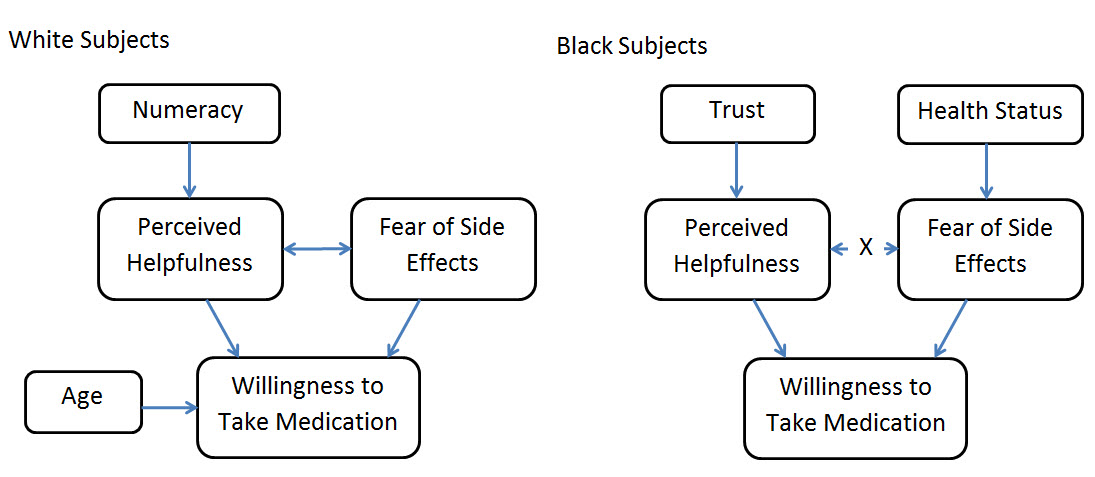Session Information
Session Type: Abstract Submissions (ARHP)
Background/Purpose: Numerous studies have found that Black patients are more risk averse than their White counterparts. In clinical practice, patients make judgments based on oral information provided to them by their physicians; yet most studies have examined patients’ perceptions using written information. The objective of this study was to examine the factors underlying Black and White patients’ treatment preference after hearing about a new medication described to them orally by a physician.
Methods: Subjects with a connective tissue disease, recruited from University-affiliated rheumatology practices, listened to a professionally-recorded standardized description of a medication. Prior to hearing the description, demographic and clinical characteristics (by self-report), trust in physicians and subjective numeracy (using validated scales) were ascertained. Helpfulness of the proposed treatment, fear about the side effects, and willingness to take the medication were measured using 7-point numeric rating scales. Kendall Tau b correlation coefficients between subjects’ characteristics and their perceptions related to the medication are reported.
Results: We interviewed 284 subjects: 71 Black [mean (SD) age = 50.4 (13.5); 83% female] and 213 White [mean (SD) age 57.4 (14.7); 73% female]. Increased helpfulness and less fear of side effects were associated with increased willingness to take the medication among Black (r= 0.60, p<0.0001 and r= -0.22, p=0.02, respectively) and White subjects (r= 0.49, p<.0001 and r= -0.36, p<.0001, respectively). Older age was associated with decreased willingness to take the medication among White subjects only. Health status, trust and subjective numeracy did not have a direct effect on willingness to take the medication in either Black or White subjects. However, higher subjective numeracy was associated with increased perceived helpfulness in White subjects (r= 0.125, p=0.005), while greater trust was associated with increased perceived helpfulness (r= 0.20, p=0.02) in Black subjects. Poor health status was associated with greater fear (r=0.247, p=0.01) in Black subjects only. Helpfulness and fear were inversely correlated in White (r= -0.126, p<.0001), but not Black subjects (r= 0.007, p=0.9).
Conclusion: After hearing about a medication, Black subjects’ treatment preferences were indirectly influenced by self-reported health status and trust and directly influenced by perceived helpfulness of the proposed treatment and fear of the side effects. In contrast, White subjects’ treatment preferences were indirectly influenced by numeracy and directly influenced by age, perceived helpfulness and fear of the side effects. An inverse relationship between perceived helpfulness and fear (indicative of a confounding effect) was observed among White, but not Black subjects. The factors that influence how Black and White patients respond to information about medications differ.
Disclosure:
L. Fraenkel,
None;
R. L. Street Jr.,
None;
E. Peters,
None.
« Back to 2013 ACR/ARHP Annual Meeting
ACR Meeting Abstracts - https://acrabstracts.org/abstract/understanding-differences-between-black-and-white-patients-reactions-to-new-treatment/

